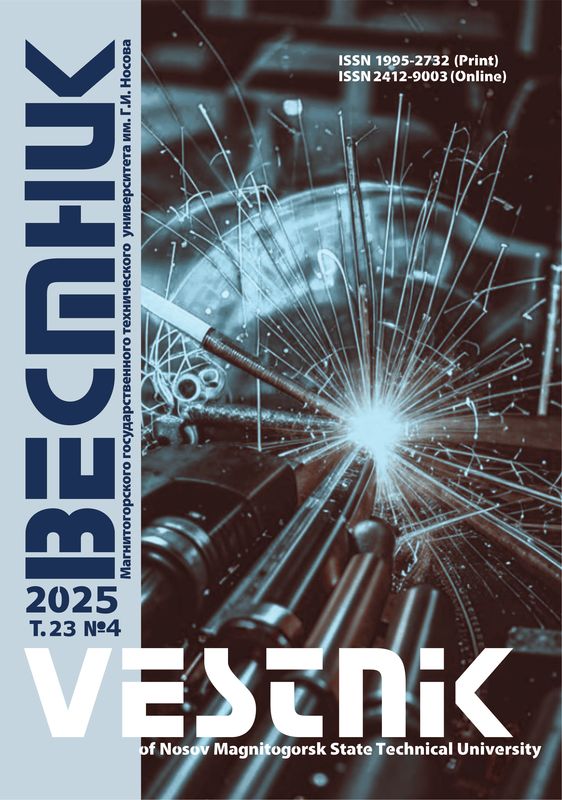DOI: 10.18503/1995-2732-2023-21-2-21-28
Abstract
Problem Statement. Factoring into the depletion of silicate aluminum-containing traditional raw materials for the production of ceramic materials of the construction application, it is necessary to find and study how to replace them with industry-related raw materials. Such experience has been shown by advanced foreign states that also used is as a tool for protecting the environment against various negative consequences. Objectives. The research is aimed at producing acid-resistant materials based on metallurgical waste, namely a clay part of gravity tailings of zircon-ilmenite ores (GZI) used as a clay binder and ferrotitanium slag used as a leaner without the use of natural traditional materials; studying the effect of slag on the technical characteristics of acid-resistant materials. Methods Applied. To study the raw materials, modern chemical analysis methods were used in the research: JSM 6390A, a scanning electron microscope by Jeol, Japan, to perform an elemental analysis; immersion liquids, transparent sections and polished sections, microscopes MIN-8 and MIN-7 were used for the petrographic study. To determine the technical properties, GOST 961-89 “Acid-resistant and thermostable acid-resistant ceramic tiles” of the KSh brand (acid-resistant chamotte) was used. Result. The studies have shown that the use of GZI without ferrotitanium slag, which is applied as a leaner, does not contribute to producing acid-resistant tiles in compliance with the requirements of GOST 961-89 for acid resistance even at a firing temperature of 1300 ℃ because of a higher content of iron oxide (Fe2O3 >6%) in GZI. Introducing ferrotitanium slag, containing aluminum oxide A12O3 > 70%, into compositions of ceramic mixtures contributes to an increase in acid resistance. Practical Relevance. The use of ferrotitanium slag with an increased content of aluminum oxide makes it possible to produce acid-resistant tiles with increased technical indicators.
Keywords
clay part, ferrotitanium slag, acid-resistant tiles, metallurgical waste, ecology
For citation
Abdrakhimov V.Z. Recycling of Metallurgical Waste Without the Use of Natural Traditional Materials in the Production of Acid-Resistant Materials. Vestnik Magnitogorskogo Gosudarstvennogo Tekhnicheskogo Universiteta im. G.I. Nosova [Vestnik of Nosov Magnitogorsk State Technical University]. 2023, vol. 21, no. 2, pp. 21-28. https://doi.org/10.18503/1995-2732-2023-21-2-21-28
1. Volynkina E.P. Analysis of the state and difficulties of processing industry-related waste in Russia. Vestnik Sibirskogo gosudarstvennogo industrialnogo universiteta [Bulletin of Siberian State Industrial University]. 2017;(2):43-49. (In Russ.)
2. Romanov P.S., Romanova I.P. Recycling of metallurgical industry waste as a way to save natural resources and reduce environmental tensions. Sinergiya [Synergy]. 2016;(2):94-99. (In Russ.)
3. Romanova I.P., Begunov O.B. The use of metallurgical industry waste in the construction industry as a way to save natural resources and reduce environmental tensions. Territoriya nauki [The Territory of Science]. 2016;(2): 53-57. (In Russ.)
4. Bautin V.M., Mychka S.Yu. Areas of development of the waste recycling system for industrial production subsystems of the agro-industrial complex. Territoriya nauki [The Territory of Science]. 2015;(6):91-97. (In Russ.)
5. Abdrakhimova E.S. Recycling of ferrotitanium slag into the production of earthquake-resistant bricks based on beidellite clay. Ekologiya i promyshlennost Rossii [Ecology and Industry of Russia]. 2021;25(7):32-36. DOI: 10.18412/1816-0395-2021-7-32-36
6. Kalner V.D. Ecologically oriented habitat is an integral criterion of the quality of life. Ekologiya i promyshlennost Rossii [Ecology and Industry of Russia]. 2019;23(11):50-54. (In Russ.)
7. Kryazhev A.M., Gusev T.V., Tikhonova I.O., Ocheretenko D.P., Almgren R. Pulp and paper production: sustainable development and the formation of a closed-loop economy. Ekologiya i promyshlennost Rossii [Ecology and Industry of Russia]. 2020;24(11):48-53. (In Russ.)
8. Koryakov V.E., Shishkina A.A., Shishkina P.A. Influence of metallurgical enterprises on the environment and human health. Izvestiya Tulskogo gosudarstvennogo universiteta. Tekhnicheskie nauki [Proceedings of Tula State University. Engineering Sciences]. 2019;(7):275-278. (In Russ.)
9. Krakht V.B., Merker E.E., Krakht L.N. Development of metallurgy and problems of ecology. Fundamentalnye issledovaniya [Basic Research]. 2005;(2):78-79. (In Russ.)
10. Govorushko S.M. Influence of non-ferrous metallurgy on the environment. Geografiya v shkole [Geography at School]. 2018;(6):3-7. (In Russ.)
11. Dadykin V.S., Dadykina O.V. Methodology for calculating the necessary increase in reserves in the management of reproduction of the mineral resource base. Vestnik Samarskogo gosudarstvennogo ekonomicheskogo universiteta [Bulletin of Samara State Economical University]. 2019;(3):54-57. (In Russ.)
12. Abdrakhimova V.Z., Abdrakhimova E.S. A porous filler based on aspiration dust from ferrochrome and a liquid glass composition. Ekologiya promyshlennogo proizvodstva [Ecology of Industrial Production]. 2023;(1):3-6. DOI: 10.52190/2073-2589_2023_1_2
13. Dubovik O.L. Reform of the European Legislation on waste. Rossiyskoe pravo: obrazovanie, praktika, nauka [Russian Law: Education, Practice, Science]. 2010;(5-6):80-84. (In Russ.)
14. Abdrakhimova E.S., Abdrakhimov V.Z. Study on a phase composition of a ceramic material of over a hundred years old. Khimicheskaya tekhnologiya [Chemical Technology]. 2023;(2):42-48. DOI: 10.31044/1684-5811-2023-24-2-42-48
15. Abdrakhimova E.S., Abdrakhimov V.Z. Influence of chemical production waste, aluminum-alkali sludge, on the phase composition of porcelain stoneware. Novye ogneupory [New Refractories]. 2023;(1):46-51. (In Russ.)
16. Rytvin V.M., Perepelitsyn V.A., Ponamarenko A.A., Gilvang S.I. Ferrochrome aluminothermal slags are industry-related raw materials for a multifunctional use. Part 1. The material composition and properties of ferrochrome slags. Novye ogneupory [New Refractories]. 2017;(10):8-14. (In Russ.)
17. Abdrakhimova E.S., Abdrakhimov V.Z. Fiziko-khimicheskie protsessy pri obzhige kislotouporov [Physical and chemical processes in firing acid-resistant materials]. Saint Petersburg: Nedra, 2003, 273 p. (In Russ.)












